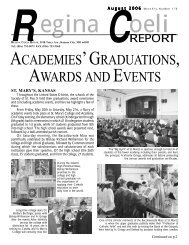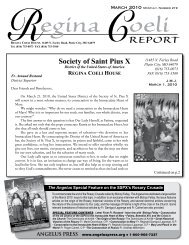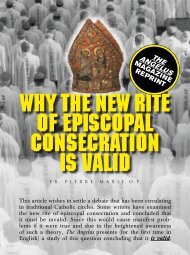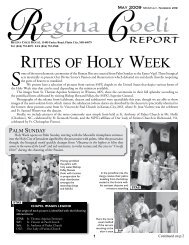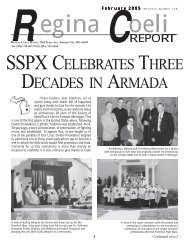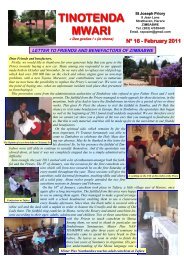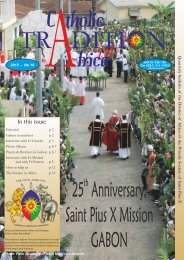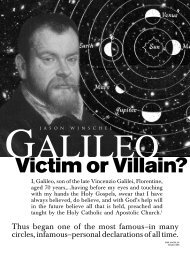Is Feeneyism Catholic? - Society of St. Pius X
Is Feeneyism Catholic? - Society of St. Pius X
Is Feeneyism Catholic? - Society of St. Pius X
Create successful ePaper yourself
Turn your PDF publications into a flip-book with our unique Google optimized e-Paper software.
T HE TEACHING OF THE CHURCH 49<br />
lieves, pr<strong>of</strong>esses, and teaches that...” Hence both paragraphs have<br />
the very same degree <strong>of</strong> authority.<br />
COUNCIL OF TRENT<br />
As the Council <strong>of</strong> Florence made its own <strong>St</strong>. Thomas’s teaching<br />
on Baptism <strong>of</strong> Desire, so did the Council <strong>of</strong> Trent. The very<br />
famous expression “re aut voto–in deed or in desire” 67 was used<br />
twice by the Council <strong>of</strong> Trent, once in the explanation (“chapter”)<br />
explicitly applied to the necessity <strong>of</strong> baptism and once even in an<br />
ex cathedra canon on the very necessity <strong>of</strong> sacraments in general.<br />
Here are the texts <strong>of</strong> the Council:<br />
Session 6, Chapter 4: Justification is a passing from the state<br />
in which man is born a son <strong>of</strong> the first Adam, to the state <strong>of</strong> grace<br />
and adoption as sons <strong>of</strong> God (see Rom. 8:15) through the second<br />
Adam, Jesus Christ our Savior. After the promulgation <strong>of</strong><br />
the gospel this passing cannot take place without the water <strong>of</strong><br />
regeneration or the desire for it, as it is written: “Unless a man be<br />
born again <strong>of</strong> water and the Holy Ghost, he cannot enter into<br />
the kingdom <strong>of</strong> God” (Jn. 3:5).<br />
Session 7, Canon 4 : If anyone says that the sacraments <strong>of</strong> the<br />
New Law are not necessary for salvation, but that they are superfluous;<br />
and that men can, without the sacraments or the desire<br />
<strong>of</strong> them, obtain the grace <strong>of</strong> justification by faith alone, although<br />
it is true that not all the sacraments are necessary for each individual,<br />
let him be anathema (Dz. 847).<br />
These texts are so strong an approval <strong>of</strong> the doctrine <strong>of</strong> baptism<br />
<strong>of</strong> desire that a doctor <strong>of</strong> the Church, <strong>St</strong>. Alphonsus Liguori,<br />
states that “it is de fide that there are some men saved by baptism<br />
<strong>of</strong> desire” and explicitly refers to these texts to support his affirmation.<br />
However, the followers <strong>of</strong> Fr. Feeney try to escape the Council’s<br />
doctrine by a false reasoning. In a leaflet entitled Desire, Justification<br />
and Salvation at the Council <strong>of</strong> Trent put out by Saint<br />
Benedict Center, they set their reasoning in five points68 :<br />
1) The <strong>Catholic</strong> Faith is the foundation <strong>of</strong> all justification.<br />
[Session 6, Chapter 6, 7, 8] 2) A person who has the <strong>Catholic</strong><br />
Faith can attain the state <strong>of</strong> justification69 if that person receives<br />
67<br />
ST, III, Q.68, A.2, see p.73.



